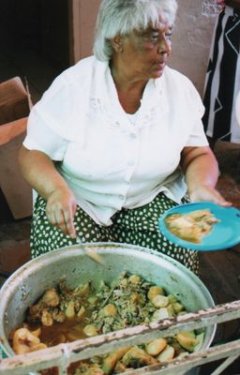| "Apology: To some of my friends who read this and are farmers. I imply no criticisms of or judgements on their farming methods and beg their forgiveness if anything I say is taken amiss. They are operating in this sad real world and have to comply with the New Economic (dis)Order and, with things as they are, they can do little else if they are to survive." |
|
MICROFARMS AND HEALTH - THE QUALITY OF LIFE

Microfarm produce for Queenstown destitute and kids feeding scheme; one of Mrs Philips's helpers dishing it out
| | The advantages of microfarming here come in two sizes:
The small one is the improvement to people's health that follows from the widespread adoption of the microfarm as a significant food supplier and contributor to livelihoods:
- Produce is fresher (very short plot-to-pot time) and so retains more of its nutrient qualities
- Fresh vegetables, fruit and milk are more affordable as consumers who are not microfarmers are more likely to be buying from their neighbours who are, rather than from supermarkets supplied by the Big Hectare Farmers, and so consume more of them
- The combination of the above is good news for those living with HIV-AIDS; anti-retroviral therapy can only go so far in extending their lives. It is the unavailability or unaffordability of good quality food that now makes this disease life-threatening for the poor
- The very labour-intensity of microfarming keeps the microfarmer fit. Not for him or her are the modern diseases of obesity, diabetes, hypertension and heart disease such a threat.
|
|
The large one is the improvement to the urban environment that flows from the sudden realisation that there is no such thing as "rubbish" any more. "Waste" has value. Even "waste land" has value - especially in cities where such places often become the resort of criminals and sites for illegal activities. Making such places available to would-be microfarmers will certainly tidy up a neighbourhood. Meanwhile, the rubbish that was dumped there will find its way to the compost heaps of or be used for mulch by dozens of microfarmers round about. And now that "rubbish" is seen in a different light, it becomes more profitable to sort it, with the non-biodegradable fraction going on to recycling plants
and the rest going for compost.
As for the Big Hectare Farmers, the only advantage they may have are the profits and subsidies that their farming generate which enable them to pay for the private health insurance needed to treat those modern diseases and the golf club membership fees needed to maintain good relations with their bank managers. | |

Queenstown; kids and destitutes enjoying lunch
|
|
|